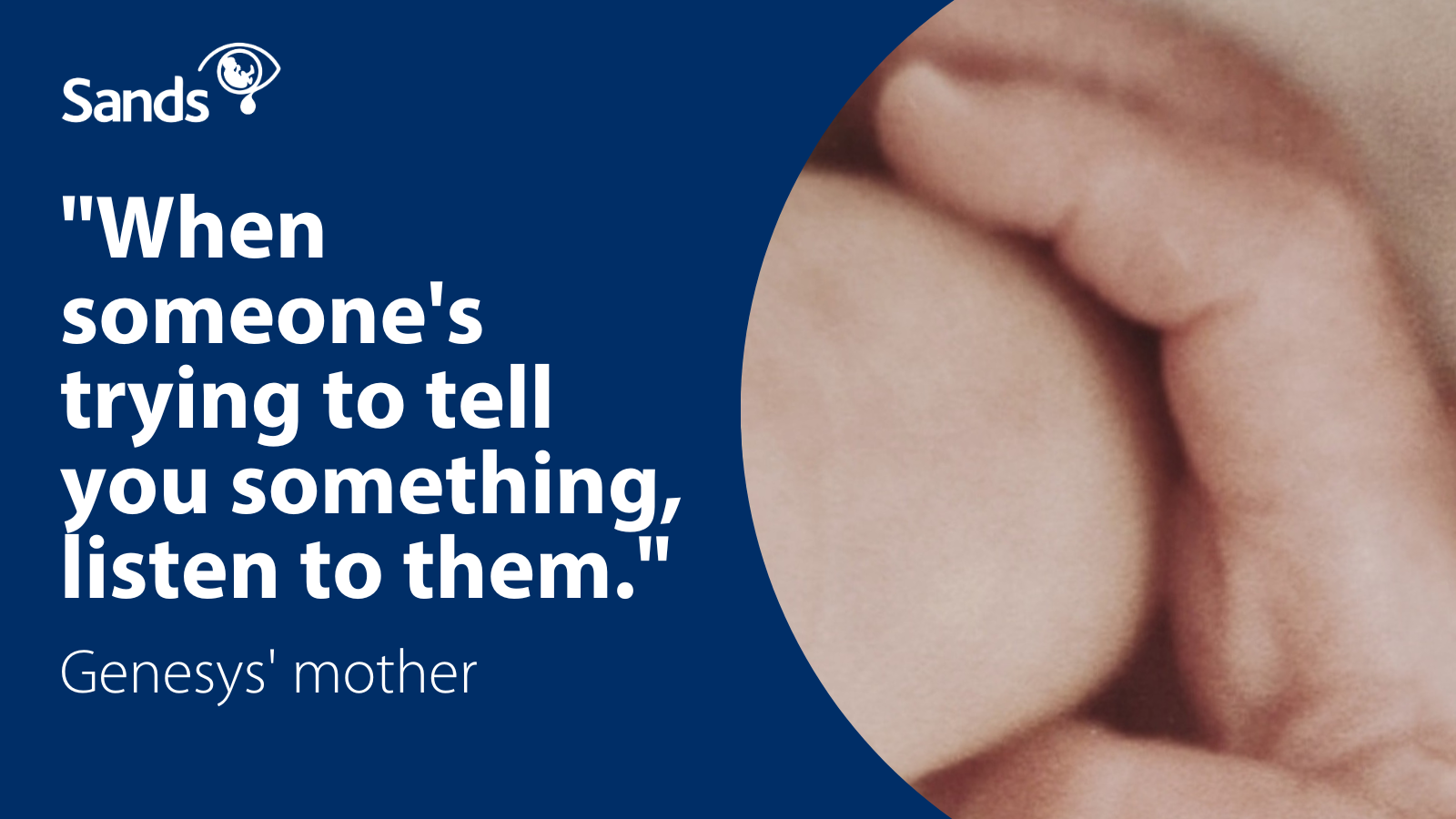A bereaved mother of mixed Black and white British ethnicity told us how she had struggled to get information about what was happening in her own pregnancy. After her daughter, Genesys, was stillborn at 24 weeks, the mother was left feeling that saving her child had not been a priority for those involved in her care.
This story was shared with Sands as part of the Listening Project. Some of the details in this story may be upsetting to read or hear, please remember that we are here for you.
After a scan at 16 weeks, the mother felt anxious and upset, because it was written in her notes that there was some kind of ‘restriction’ in the umbilical cord. She was not given any information about what this could mean for her baby, although a doctor told her she should have more regular midwife appointments as a result.
At her next appointment with a community midwife and student midwife, the mother found the midwife’s attitude confrontational and stereotyping. She was still very worried about the umbilical cord and asked the midwife to explain what was written in her notes.
At the end of the appointment, the midwife arranged their next appointment for six weeks later, although the mother explained that the consultant had said she should be seen more regularly because of the issue with the umbilical cord. The mother wanted to know why she was not receiving her care in the hospital setting as it said in her notes that she was ‘high risk’. The community midwife was uncertain why the pregnancy was documented as being ‘high risk’, but did not explore this further, despite the mother repeatedly asking her to.
The mother thought hard about how the midwife had spoken to and treated her. She decided to make a complaint and spoke in detail to a senior midwife about what had happened. They talked for over 30 minutes, and the mother believed that a formal written record was being made of all her concerns.
The mother was transferred to a different community midwife team. But her next appointment was still six weeks away, even though she had explained again what the obstetrician had said about her needing to be seen more often.
At 24 weeks of pregnancy, after several weeks of no contact with her midwives, the mother’s baby girl was stillborn. The mother named her daughter Genesys.
After the birth, the mother spoke to a senior midwife about the complaint she had made earlier in her pregnancy. She learnt that the complaint had not been properly documented or logged, and that the written account only described her not wanting a student in the room. No actions had been taken beyond moving the mother to a different team. When the mother explained her experience again, the senior midwife defended the community midwife involved, insisting that she was a ‘really nice’ woman who was usually good at her job, and that the stillbirth ‘would have happened anyway’.
The hospital has since reviewed the care that Genesys and her mother received. The review process was stressful and traumatic for the mother, as she had to write up her experience and revisit what had happened. After doing her own research, she was left with questions about why she didn’t get better care.
The mother waited months to receive a written record of the review meeting. When it arrived, she found it did not describe in any detail what had been discussed. She is still chasing answers.
She has not found the complaints process to be open or honest and feels it doesn’t have enough regard for the wellbeing of families who have lost their loved ones.
In the past, the mother did not think that her ethnicity would affect her care in the NHS. After this experience, she is not sure. She wonders why she struggled to access the basic information and care she was entitled to and feels that she is now being ignored because of her ethnicity. She also found that staff were not able to discuss her ethnicity and potential risks as part of her whole identity.
When she was on the postnatal ward, shortly after her loss, she experienced dismissive attitudes from midwives about stillbirth in Black mothers.
The mother has been told by the hospital that she would get better care in a future pregnancy but does not feel that she can trust hospitals again because of the experience she has had.
She has been left feeling frustrated and hurt that her concerns were dismissed. She believes that if staff had listened to her and taken her seriously, she could have been involved in planning her care, and Genesys might have had a chance to live.
You can read the findings of the Listening Project and how we're using this to tackle inequalities in baby deaths and get involved in our campaigning on this issue.
Sands supports anyone who has been affected by the death of a baby before, during or shortly after birth. We also offer tailored support for Black and South Asian parents, family members and others following pregnancy loss or the death of a baby.

